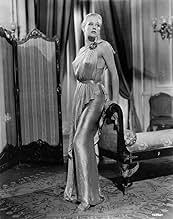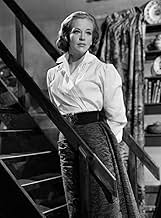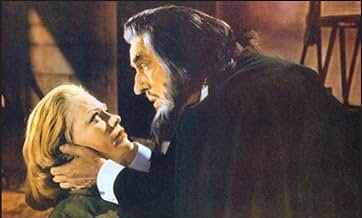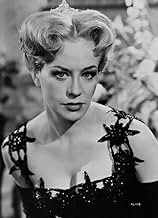The story of a genius who hypnotizes an artist's model into becoming a great concert singer, and how she escapes from his influence only by his death.The story of a genius who hypnotizes an artist's model into becoming a great concert singer, and how she escapes from his influence only by his death.The story of a genius who hypnotizes an artist's model into becoming a great concert singer, and how she escapes from his influence only by his death.
- Director
- Writers
- Stars
- Nominated for 1 BAFTA Award
- 1 nomination total
Hildegard Knef
- Trilby
- (as Hildegarde Neff)
- Director
- Writers
- All cast & crew
- Production, box office & more at IMDbPro
5.5221
1
2
3
4
5
6
7
8
9
10
Featured reviews
Colourful costume romp with some ham acting
SVENGALI is a British-made version of the classic story about the evil hypnotist who creates a famous singer out of a young and untalented girl. In essence this tale is Rasputin in the music world, and it's quite a fun and eventful storyline.
The main reason to enjoy this film is the performance of Donald Wolfit (BLOOD OF THE VAMPIRE) in the title role. He seems to be channelling Bela Lugosi in both look and voice throughout the movie, and his hammy style of acting is a lot of fun; the other actors in the production feel flat by comparison.
The film as a whole isn't perfect - there's a little too much sappy romance going on, and events are never as exciting or dramatic as the producers would hope for - but the lush colours and costumes of the mid 1950s give this the look and feel of an early Hammer Horror outing. Hildegard Knef (later of Hammer's THE LOST CONTINENT) is fine as the youthful protégé, and it's fun to see Terence Morgan (CURSE OF THE MUMMY'S TOMB) before he got typecast as the bad guy.
The main reason to enjoy this film is the performance of Donald Wolfit (BLOOD OF THE VAMPIRE) in the title role. He seems to be channelling Bela Lugosi in both look and voice throughout the movie, and his hammy style of acting is a lot of fun; the other actors in the production feel flat by comparison.
The film as a whole isn't perfect - there's a little too much sappy romance going on, and events are never as exciting or dramatic as the producers would hope for - but the lush colours and costumes of the mid 1950s give this the look and feel of an early Hammer Horror outing. Hildegard Knef (later of Hammer's THE LOST CONTINENT) is fine as the youthful protégé, and it's fun to see Terence Morgan (CURSE OF THE MUMMY'S TOMB) before he got typecast as the bad guy.
Very melodramatic
A bit over the top with the acting but this may have been deliberate to give it a certain theatre like feel as film acting is usually more subtle than as done on the stage, for a far away audience.
Beautifully shot in glorious saturated colour and the sets were extremely well done with seemingly no expense spared. I failed to spot some of the actors, later to be very much well known, in minor roles here.
There has been several fairly recent instances of singers, performers etc. Being controlled by very much like Svengali managers so the plot is in no way hard to believe.
A very interesting film worth watching.
Beautifully shot in glorious saturated colour and the sets were extremely well done with seemingly no expense spared. I failed to spot some of the actors, later to be very much well known, in minor roles here.
There has been several fairly recent instances of singers, performers etc. Being controlled by very much like Svengali managers so the plot is in no way hard to believe.
A very interesting film worth watching.
Unintentionally hilarious
Donald Wolfit gets my vote as Best Animated Cartoon character of 1955. He cracks his fingers before 'playing' the piano, just like Bugs Bunny!
I think this Svengali dies of overacting.
There is a special bonus in this film: an uncredited (and very young) Jeremy Brett appears as a very happy art student in two sequences. He has a few lines and some nice closeups, and even gets to sing along with Harry Secombe on "Alice Where Art Thou". A curious concept.
Hildegarde Knef is very beautiful and the film is nicely art directed, except when she wears the Dior gowns. And the 'art' is pure Fifties kitsch. Some of the dialogue is so hilarious you will be yelling along with it, ROCKY HORROR-SHOW style.
I think this Svengali dies of overacting.
There is a special bonus in this film: an uncredited (and very young) Jeremy Brett appears as a very happy art student in two sequences. He has a few lines and some nice closeups, and even gets to sing along with Harry Secombe on "Alice Where Art Thou". A curious concept.
Hildegarde Knef is very beautiful and the film is nicely art directed, except when she wears the Dior gowns. And the 'art' is pure Fifties kitsch. Some of the dialogue is so hilarious you will be yelling along with it, ROCKY HORROR-SHOW style.
The Man with the Evil Eye
Several masterpieces have been transformed because the female lead became pregnant. A less select band emerged quite differently because the director or one of the actors fell off the wagon while the film was being made (Derek Bond, who here plays The Laird, was himself himself summoned a few years later to replace Dennis Price when he showed up legless at the start of shooting 'Wonderful Life'). Robert Newton's replacement in the title role by Donald Wolfit probably made the film duller, but Wolfit was far scarier than the charming old soak would have been.
Since Frederick Pusey's sets were based on the wise decision to base the look of the film on the original engravings (which accounts for all the authentically Victorian whiskers worn by most of the men and the false nose worn by Wolfit) it's a handsome film. Even more handsome is Hildegarde Neff (as she then was) as Trilby; who sportingly sang badly until transformed both by Svengali and the substitution of Elizabeth Schwarzkopf's voice on the soundtrack.
But just as she was too human to be convincing a couple of years earlier in the title role of 'Alraune' (in which she was created by Erich von Stroheim, no less), big strapping Knef is too robust to make a convincing Trilby.
Since Frederick Pusey's sets were based on the wise decision to base the look of the film on the original engravings (which accounts for all the authentically Victorian whiskers worn by most of the men and the false nose worn by Wolfit) it's a handsome film. Even more handsome is Hildegarde Neff (as she then was) as Trilby; who sportingly sang badly until transformed both by Svengali and the substitution of Elizabeth Schwarzkopf's voice on the soundtrack.
But just as she was too human to be convincing a couple of years earlier in the title role of 'Alraune' (in which she was created by Erich von Stroheim, no less), big strapping Knef is too robust to make a convincing Trilby.
Donald just couldn't help it.
Svengali, like the Curate's egg, yes it is an interesting rendition, an old story, pretty much still extant if all the stories out there are to be believed. Anyway, here we go, Hildegard Neff, luminous and totally perfect, the rest of the ensemble cast, pretty good, but in my humble opinion the great man, the doyen of the theatre and many.adventures on the silver screen was quite wooden one minute then possessed of the manucc overdone ham on the bone the next. I know this may be heresy to some, but his oeuvre has its brilliant highlights yes, but sometimes I feel his fellow thesis are a little over awed by his classic acting style.. Overall though spotting the other wee gems in there..Alfie Bass.. Harry Seacombe.. Jeremy Brett et al ..make this rewarding.
Did you know
- TriviaHildegard Knef's singing was dubbed by Elisabeth Schwarzkopf.
- Quotes
Svengali: If you choose you can put all that nonsense behind you forever.
Trilby O'Farrall: And do what, starve?
Svengali: Not if you put your trust in me absolutely, not if you do exactly what I tell you to do.
- Crazy creditsOpening credits prologue: Paris The Latin Quarter at the turn of the Century
- ConnectionsReferenced in Hilde (2009)
Details
- Release date
- Country of origin
- Language
- Also known as
- Sihirbazın İntikamı
- Filming locations
- Nettlefold Studios, Walton-on-Thames, Surrey, England, UK(studio: filmed at)
- Production company
- See more company credits at IMDbPro
- Runtime
- 1h 22m(82 min)
- Color
- Aspect ratio
- 1.37 : 1
Contribute to this page
Suggest an edit or add missing content





































